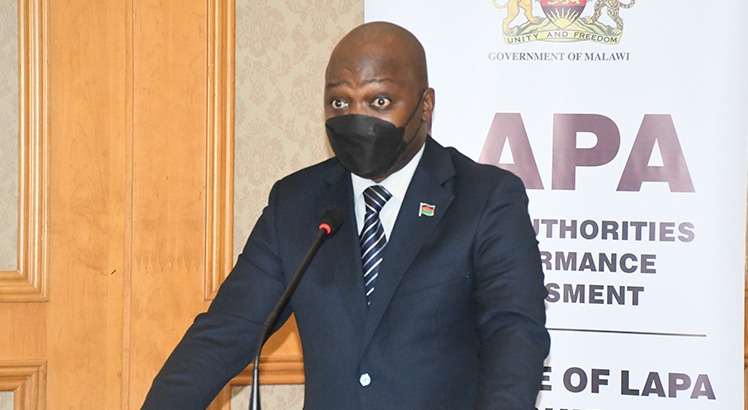DCs face chop
Minister of Local Government Blessings Chinsinga says he will overhaul leadership in councils on the back of payroll fraud in the local authorities.
His warning follows reports at Chitipa District Council where K10 million has been allegedly lost after 17 “ghost workers” were introduced on the payroll and received salaries for four months from January this year.

The scandal also comes on top of other cases from last year at Ntchisi District Council where K138 million was lost through manipulation of figures and introduction of fake employees on the payroll.
Again in 2021, the Anti-Corruption Bureau arrested officials from Salima District Council for keeping on the payroll deceased employees and those who left the establishment, which led to a loss of K33 million.
These three incidences have led to a combined loss of K181 million.
Chinsinga, in an interview on Sunday, said the payroll fraud is indicative of leadership problem facing councils.
“This is giving decentralisation a bad name. We had to decentralise the payroll with the hope that its management will be efficient, but then we have these cases.

“Some of these challenges are a result of the kind of leadership we have in councils. I called for the CVs [curriculum vitae] because we want to have a complete overhaul of the leadership in councils to improve on efficiency, including payroll management.”
The Department of Human Resource Management and Development (DHRMD) has since asked the Ministry of Local Government to crack the whip against some district commissioners (DCs), arguing that the payroll fraud demonstrates negligence on the part of controlling officers.
The Public Finance Management Act (2022) under Section 14 (1) states that a controlling officer shall ensure that expenditure is properly authorised and applied to the specific purposes for which it is appropriated and this includes salaries.
A senior official from the Ministry of Local Government, who spoke on condition of anonymity, said corruption and payroll fraud has become prevalent in councils because controlling officers are not personally held accountable.
But the Malawi Local Government Association (Malga) said it is unfair to blame DCs who are doing a commendable job to fight fraud in councils.
Malga executive director Hadrod Mkandawire argued that the fact that councils on their own are able to detect payroll fraud, it means the DCs are in control.
He said: “All these cases were detected by the councils themselves and not outsiders such as auditors.
“This, therefore, means that councils have robust systems. We do not agree with the suggestion to have a complete overhaul of leadership in councils.”
Last year DHRM, released a report on personnel audit it conducted, which established that some of the civil servants who died, retired or resigned are still on government payroll.
Chitipa fraud detailed…
Just like in Ntchisi District Council alleged fraud, 17 people were introduced on the payroll of Chitipa District Council.
According to this report, members of the salary team allegedly connived to introduce the 17, who included wives and relations, on the payroll. They took advantage of the authority from DHRMD allowing the council to fill some lower cadre vacancies.
Besides mentioning 17 names of beneficiaries of this fraud, the report also includes names of suspected officials who took part in the syndicate that is under investigation.
The detailed report also includes personal confessions from some suspects who admitted wrongdoing before the DC.
One of the suspects claimed that although he is outside the salary section of the council, he received a communication from a colleague in the health sector who had told him that they had an authority to fill some vacant posts and he was asked if he would be interested to have his wife recruited.
Reads the letter in part: “I submitted my wife’s name knowing that interviews were to be conducted and that if she is successful in the interviews, she would be employed. I did not know that the salaries team had proceeded to introduce the names submitted on the payroll.
The 17 posts include health surveillance assistants, clerks, hospital attendants and ground labourers whose recruitment falls under council management while the rest are under local government commission.





